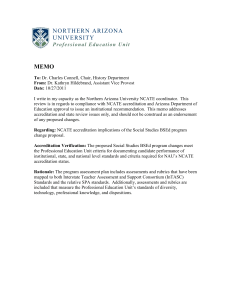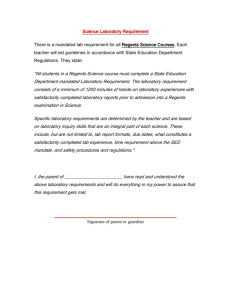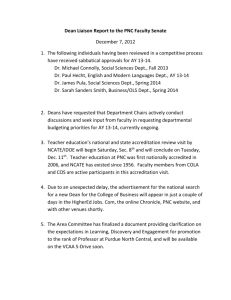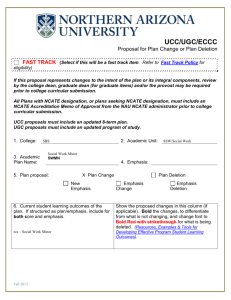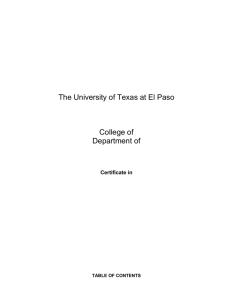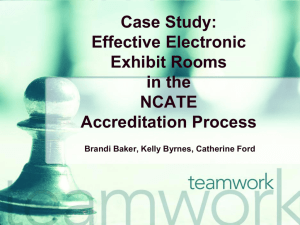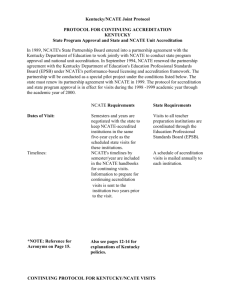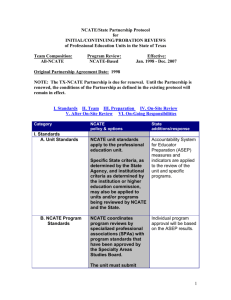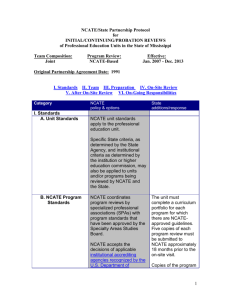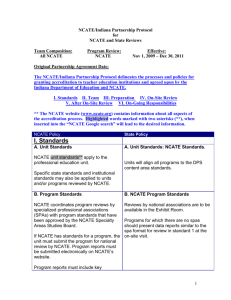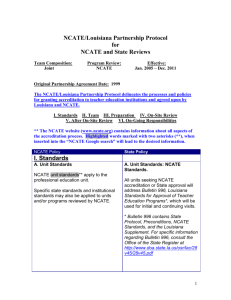Guidelines for Implementation of the Regents` Principles and Actions
advertisement
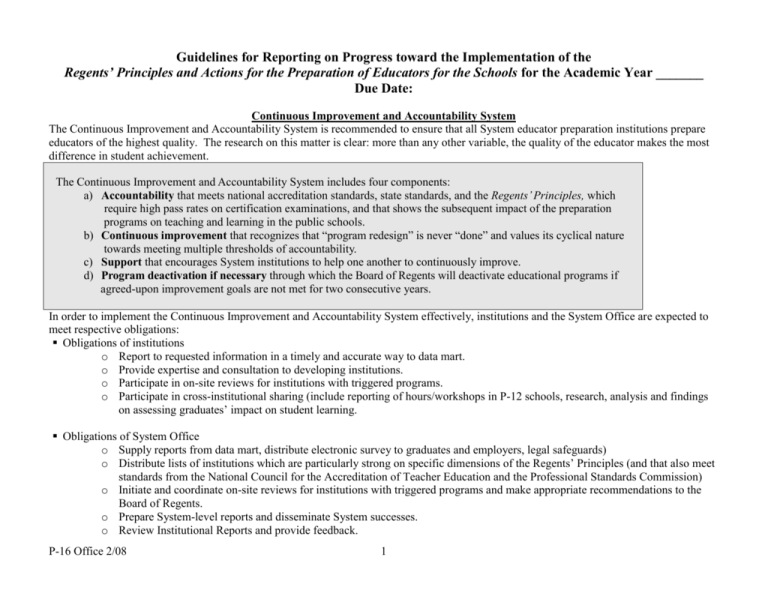
Guidelines for Reporting on Progress toward the Implementation of the Regents’ Principles and Actions for the Preparation of Educators for the Schools for the Academic Year _______ Due Date: Continuous Improvement and Accountability System The Continuous Improvement and Accountability System is recommended to ensure that all System educator preparation institutions prepare educators of the highest quality. The research on this matter is clear: more than any other variable, the quality of the educator makes the most difference in student achievement. The Continuous Improvement and Accountability System includes four components: a) Accountability that meets national accreditation standards, state standards, and the Regents’ Principles, which require high pass rates on certification examinations, and that shows the subsequent impact of the preparation programs on teaching and learning in the public schools. b) Continuous improvement that recognizes that “program redesign” is never “done” and values its cyclical nature towards meeting multiple thresholds of accountability. c) Support that encourages System institutions to help one another to continuously improve. d) Program deactivation if necessary through which the Board of Regents will deactivate educational programs if agreed-upon improvement goals are not met for two consecutive years. In order to implement the Continuous Improvement and Accountability System effectively, institutions and the System Office are expected to meet respective obligations: Obligations of institutions o Report to requested information in a timely and accurate way to data mart. o Provide expertise and consultation to developing institutions. o Participate in on-site reviews for institutions with triggered programs. o Participate in cross-institutional sharing (include reporting of hours/workshops in P-12 schools, research, analysis and findings on assessing graduates’ impact on student learning. Obligations of System Office o Supply reports from data mart, distribute electronic survey to graduates and employers, legal safeguards) o Distribute lists of institutions which are particularly strong on specific dimensions of the Regents’ Principles (and that also meet standards from the National Council for the Accreditation of Teacher Education and the Professional Standards Commission) o Initiate and coordinate on-site reviews for institutions with triggered programs and make appropriate recommendations to the Board of Regents. o Prepare System-level reports and disseminate System successes. o Review Institutional Reports and provide feedback. P-16 Office 2/08 1 Reporting and Review Process The reporting and review process for implementation of the Regents’ Principles will vary by the accreditation status of the institution. Reporting Process for Institutions with Developing Status or Probationary Status Institutions on Developmental Status (never previously accredited) will report using the process described in Table 1 below. Table 1 Reporting Process for Institutions in Developmental Stages (never previously accredited) Yearly Schedule Report to Submit Submit Conceptual Framework and Standard 2: Assessment System Years 1 & 2 What assessments do you have for each standard? How are each aligned to the Conceptual Framework? How have you assured their reliability and validity? Where are you on the data aggregation process? What data are available that demonstrate meeting standards?* Standard 3: Field Experiences Year 3 Standard 5: Faculty Standard 4: Diversity Year 4 Standard 1: Knowledge, Skills, and Dispositions Standard 6: Governance Year 5 Submit completed Conceptual Framework and evidence collected for each standard that demonstrates performance. Year 6 NCATE/PSC Accreditation Year – submit NCATE self-study report Year 7 Submit letter from NCATE’s Unit Accreditation Board. Any institutions with standards not met will submit a plan for Year 8 how that standard will be met in the next two years. *These questions should be central to the reporting for each standard in subsequent years. Review Process for Institutions with Developing Status: The unit will submit reports to the Board of Regents based on its preparation for their initial NCATE/PSC accreditation review. A three-person committee made up of individuals from institutions that recently went through PSC/NCATE continuing review will read the developmental reports and provide feedback to the institution(s). Reviews will be in the form of constructive feedback with specific responses regarding strengths, areas for improvement, and questions for continued reflection by the institution. A copy will be sent to the Board of Regents office. Reporting and Review Process for Institutions with Probationary Status: An Individually Developed Reporting Process (IDR) would be proposed and negotiated with the Board of Regents office for each institution in this category. A three-person committee made up of individuals from institutions that recently went through PSC/NCATE continuing review will read the reports and provide feedback to the institution(s). Reviews will be in the form of constructive feedback with specific responses P-16 Office 2/08 2 regarding strengths, areas for improvement, and questions for continued reflection by the institution. A copy will be sent to the Board of Regents office. An on-site review team consisting of representatives from institutions and the System Office will determine possible outcomes. Reporting Process for Institutions with Continuing Status The Regents’ Principles are closely aligned with the NCATE Standards. In an effort to streamline reporting for national, state, Board of Regents, and university requirements, all USG institutions with continuing accreditation status will submit NCATE documents based on their cycle of NCATE review as evidence of implementation of the Regents’ Principles on Quality Assurance and Collaboration as indicated in Table 2 below. As part of their NCATE reporting process, USG institutions will submit data using the common points of assessment adopted by EPAAC. Please submit the appropriate NCATE documents and complete the boxes below concerning GACE II and Professional Development Schools. In addition, for those Regents’ Principles on Responsiveness, which are not aligned with the NCATE standards (listed in Principles #3, 4, 5, and 6 below), institutions should respond in the space provided (space may be expanded as needed). Please submit electronically by February 1, 2008. Table 2 Reporting for Regents’ Principles on Quality Assurance and Collaboration Quality Assurance and Collaboration UAB Report Cycle Submission to Board of Regents NCATE’s Unit Accreditation Board Report received in Submit letter from NCATE’s Unit Accreditation Board. Any current academic year (UAB approval is one semester institutions with standards not met will submit a plan for how following NCATE onsite visit). that standard will be met in the next two years. All other years prior to or after NCATE review Submit NCATE Annual Report C with brief description and data demonstrating progress toward all cited Areas for Improvement or standards not met (Due October 1). GACE II Institutional Response: Please list here or attach the number of completers, disaggregated by ethnicity, level, and subject area and unit pass rate P-16 Office 2/08 3 PROFESSIONAL DEVELOPMENT SCHOOLS Institutional Response: Please list here or attach Professional Development Schools using NCATE definitions PRINCIPLE #3: University System institutions that prepare teachers will implement aggressive recruitment, retention, progression, completion, and induction policies to increase the numbers, to expand the diversity of candidates, and to balance supply and demand. Institutional Response: Please refer to institutional data from Teacher Production Report and Double-Double targets. If progress is not adequate in any area, please put your reaction to these data below. Also include the relevant implementation strategies you are using to improve your progress. (Please refer to strategies listed in the Principles). PRINCIPLE #4: University System institutions that prepare teachers will develop and implement innovative teacher preparation programs to respond to state need and to contribute to increased student learning and achievement in Georgia’s public schools. Institutional Response: Please describe innovations that the institution plans and/or has implemented to make new or existing programs more flexible, accessible, and responsive to state needs. Institutions may wish to refer to menu of options listed in the Principles under Principle #4 as well as to data concerning advanced program completers, endorsements, field and level of initial and advanced program completers, and statewide shortage fields. PRINCIPLE #5: University System institutions that prepare teachers will support and reward all faculty who participate significantly in approved efforts in teacher preparation and school improvement through decisions in promotion and tenure, pre-tenure and post-tenure review, annual review and merit pay, workload, recognition, allocation of resources, and other rewards. P-16 Office 2/08 4 Institutional Response: Please describe how institution is implementing policy to support and reward faculty who participate significantly in approved efforts in teacher preparation and school improvement. Please reference BOR policy 803.17. Cite examples of successes. PRINCIPLE #6: The University System will continually assess the impact of the Principles and Actions for the Preparation of Teachers for the Schools to determine whether successful implementation contributes significantly to desired changes in preparation programs, to school improvement, and to increased student learning and achievement in Georgia. Institutional Response: Optional: Please submit research, analysis, or best practices for assessing impact of graduates on P-12 student achievement in professional development schools, service area, and/or state. See Guide to Ratings below for this Principle. Review Process for Institutions with Continuing Status The System Office will review Institutional Reports for Institutions with Continuing Status and provide feedback using the following Guide to Ratings. Guide to Ratings Principle #3: University System Institutions that prepare teachers will implement aggressive recruitment, retention, progression, completion, and induction policies to increase the numbers, to expand the diversity of candidates, and to balance supply and demand. Unacceptable Acceptable No progress evident toward increasing the Progress toward increasing the numbers, numbers, expanding the diversity of expanding the diversity of candidates, and candidates, and balancing supply and demand. balancing supply and demand evident in some areas P-16 Office 2/08 5 Target Clear evidence of progress in all areas toward increasing the numbers, expanding the diversity of candidates, and balancing supply and demand Principle #4: University System institutions that prepare teachers will develop and implement innovative teacher preparation programs to respond to state need and to contribute to increased student learning and achievement in Georgia’s public schools. Unacceptable No plans for innovative programs and/or practices have been implemented. Acceptable Clear evidence of innovative programs and/or and practices implemented Target Clear evidence of positive outcomes from innovative programs and/or practices implemented Principle # 5: University System institutions that prepare teachers will support and reward all faculty who participate significantly in approved efforts in teacher preparation and school improvement through decisions in promotion and tenure, pre-tenure and post-tenure review, annual review and merit pay, workload, recognition, allocation of resources, and other rewards. Unacceptable No plans in place to implement policy to reward and support faculty for participation in K-12 schools Acceptable Evidence of institutional action to put policies and practices in place to reward and support faculty for participation in K-12 schools Target Policies and practices of faculty supported and rewarded for participation in K-12 schools are clearly in place. Principle # 6: The University System will continually assess the impact of the Principles and Actions for the Preparation of Teachers for the Schools to determine whether successful implementation contributes significantly to desired changes in preparation programs, to school improvement, and to increased student learning and achievement in Georgia. Unacceptable Data incomplete or not submitted P-16 Office 2/08 Acceptable Data complete, submitted on time, and in correct format to Educator Preparation Data Mart 6 Target Research, analysis, or best practices for assessing impact of graduates on P-12 student achievement in professional development schools, service area, and/or state submitted

